Cinema Novo, "New Cinema" in English, is a genre and movement of film noted for its emphasis on social equality and intellectualism that rose to prominence in Brazil during the 1960s and 1970s. Cinema Novo formed in response to class and racial unrest both in Brazil and the United States. Influenced by Italian neorealism and French New Wave, films produced under the ideology of Cinema Novo opposed traditional Brazilian cinema, which consisted primarily of musicals, comedies and Hollywood-style epics. Glauber Rocha is widely regarded as Cinema Novo's most influential filmmaker. Today, the movement is often divided into three sequential phases that differ in tone, style and content.

The Working Class Goes to Heaven, released in the US as Lulu the Tool, is a 1971 Italian satirical political drama film directed by Elio Petri. It depicts a factory worker's realisation of his own condition as a simple tool in the process of production. The film was awarded the Grand Prix du Festival International du Film at the 25th Cannes Film Festival, sharing it with Francesco Rosi's The Mattei Affair.
Robert Stam is an American film theorist working on film semiotics. He is a professor at New York University, where he teaches about the French New Wave filmmakers. Stam has published widely on French literature, comparative literature, and on film topics such as film history and film theory. Together with Ella Shohat, he co-authored Unthinking Eurocentrism: Multiculturalism and the Media.

Franco Interlenghi was an Italian actor.
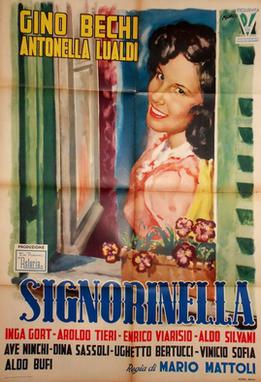
Little Lady is a 1949 Italian comedy film directed by Mario Mattoli and starring Gino Bechi, Antonella Lualdi and Aroldo Tieri. It was shot at the Farnesina Studios in Rome and on location around Introdacqua in L'Aquila. The film's sets were designed by the art director Mario Rappini. It earned around 66 million lira at the box office.

Antonella Lualdi was an Italian actress and singer. She appeared in many Italian and French films in the 1950s and 1960s, notably in Claude Autant-Lara's film The Red and the Black in 1954.

The Captain's Daughter is a 1947 Italian historical adventure film directed by Mario Camerini and starring Irasema Dilián, Amedeo Nazzari and Vittorio Gassman. It was one of a number of ambitious historical epics made in the wake of the successful 1946 film The Black Eagle. The film's sets were designed by the art director Piero Filippone. It was entered into the 1947 Cannes Film Festival. It is based on the 1836 novel of the same name by Alexander Pushkin, which is set in Russia during the reign of Catherine II. It takes place during the Cossack Rebellion.
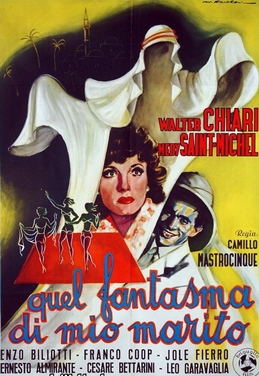
That Ghost of My Husband is a 1950 Italian comedy film directed by Camillo Mastrocinque and starring Walter Chiari, Enzo Biliotti and Jole Fierro. The film's sets were designed by the art director Angelo Zagame. It financed by the Sicilian producer Ferdinando Briguglio who had previously backed Luigi Zampa's Difficult Years. For many years it was considered a lost film before being rediscover in an attic and restored by the Cineteca di Bologna and the National Museum of Cinema in Turin.
A film à clef is a film describing real life, behind a façade of fiction. "Key" in this context means a table one can use to swap out the names.
Petanqui (original title: Pétanqui is a 1983 drama film directed by Yeo Kozoloa.
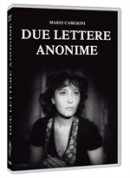
Due lettere anonime, internationally released as Two Anonymous Letters, is a 1945 Italian war-melodrama film directed by Mario Camerini.
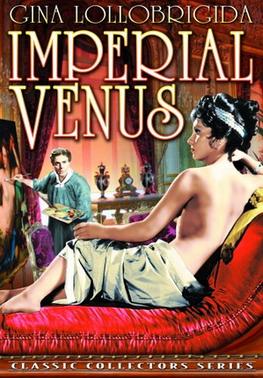
Imperial Venus is a 1962 French-Italian historical film directed by Jean Delannoy and starring Gina Lollobrigida, Stephen Boyd and Raymond Pellegrin. It depicts the life of Pauline Bonaparte, the sister of Napoleon. For her performance Lollobrigida won the David di Donatello for best actress and the Nastro d'Argento for the same category.

Follow Your Heart is a 1996 Italian romantic drama film written and directed by Cristina Comencini. It is based on the novel with the same name by Susanna Tamaro.
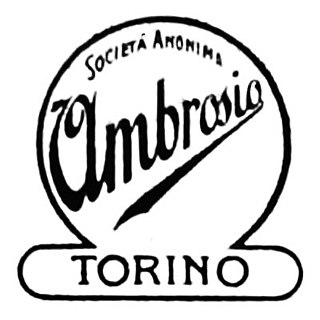
Ambrosio Film was an Italian film production and distribution company which played a leading role in Italian cinema during the silent era. Established in Turin in 1906 by the pioneering filmmaker Arturo Ambrosio, assisted by cinematographers Giovanni Vitrotti and Roberto Omegna, the company initially produced large numbers of documentary and fictional short films, but its output quickly grew more ambitious.

Three Lucky Fools is a 1933 French-Italian comedy film directed by Mario Bonnard and starring Tito Schipa, Eduardo De Filippo, and Fred Pasquali. It marked the film debut of Assia Noris, who went on to be a leading Italian star.
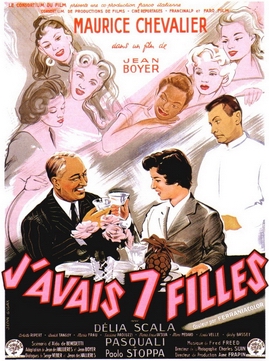
My Seven Little Sins, released in UK as I Had Seven Daughters, is a 1954 French-Italian comedy film co-written and directed by Jean Boyer and starring Maurice Chevalier and Delia Scala. It is based on a comedy play of Aldo De Benedetti, previously adapted by Nunzio Malasomma in the film We Were Seven Sisters.

Ferdinand Guillaume (1887–1977) was a French-born Italian actor and film director. He often is known by his stage name Polidor.
Ernesto Maria Pasquali (1883–1919) was an Italian pioneering film producer and director. Originally a journalist he was employed by Ambrosio Film before he set up the Turin-based Pasquali Film, one of Italy's leading production companies. Shortly after his death in 1919 it was subsumed into larger conglomerate Unione Cinematografica Italiana.
Giovanni Cimara (1889–1970) was an Italian film actor, mainly of the silent era.













